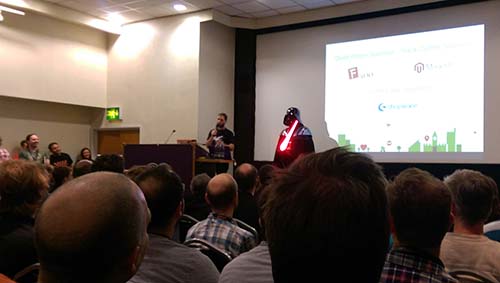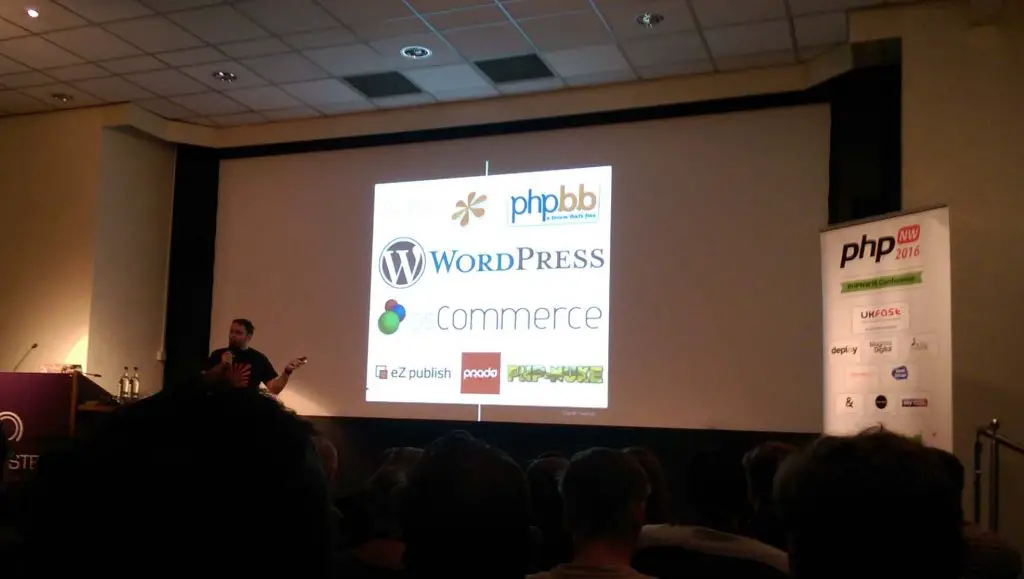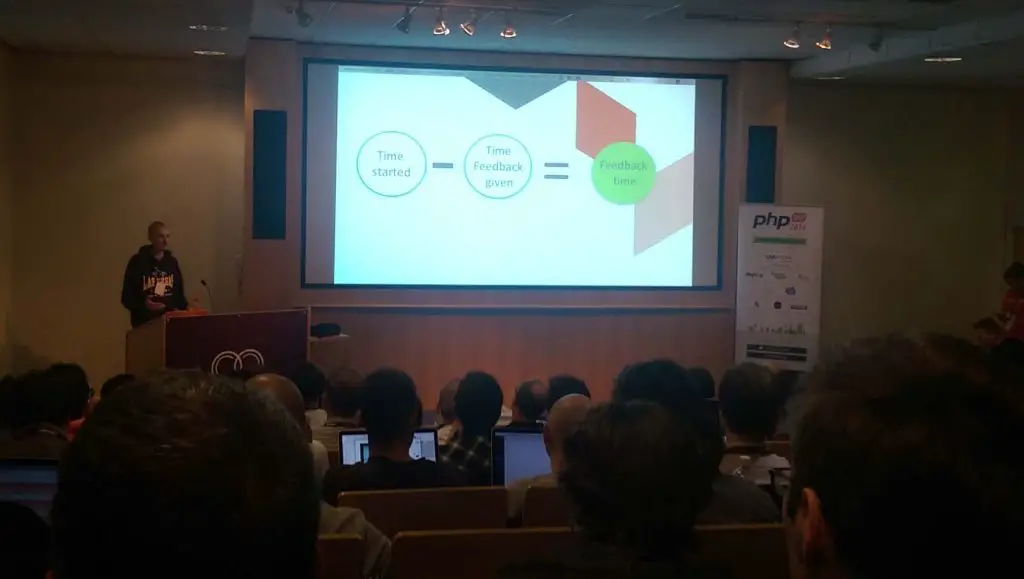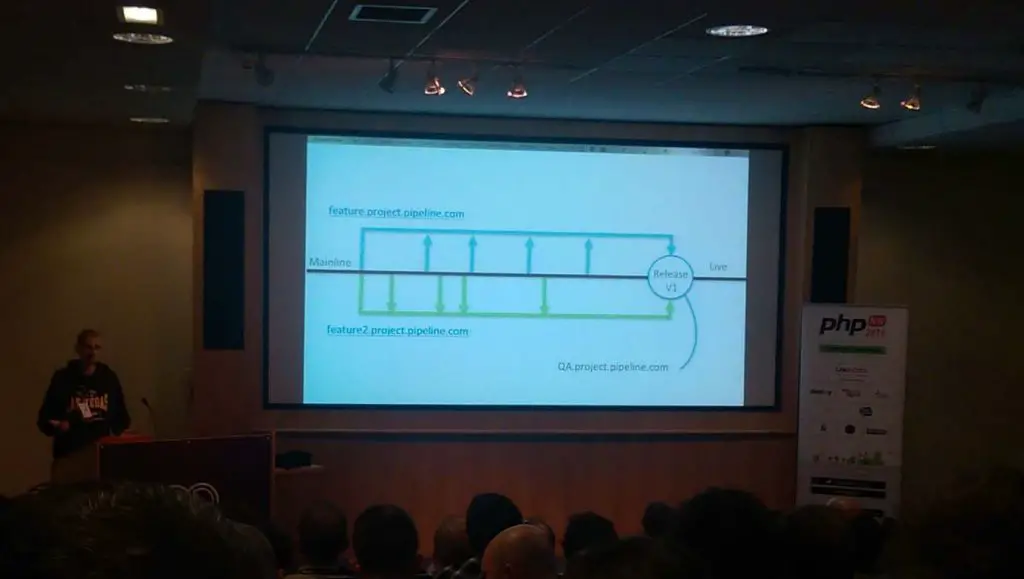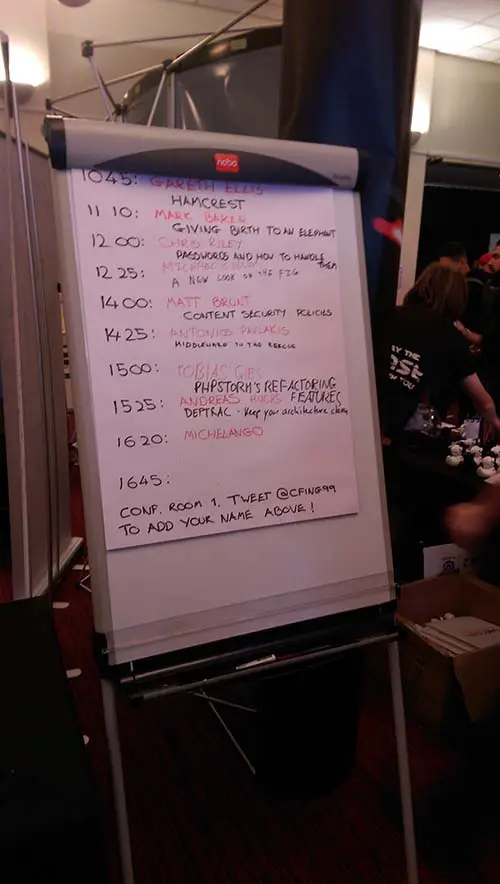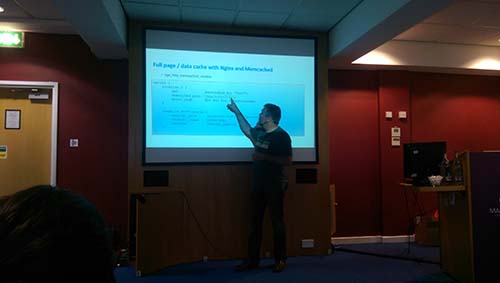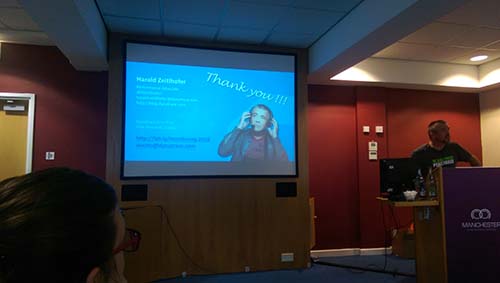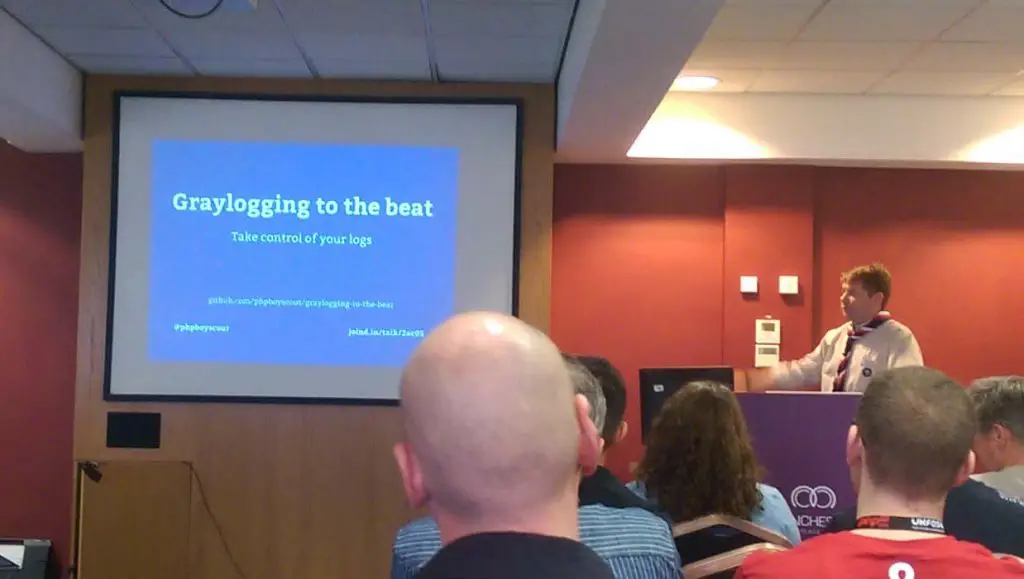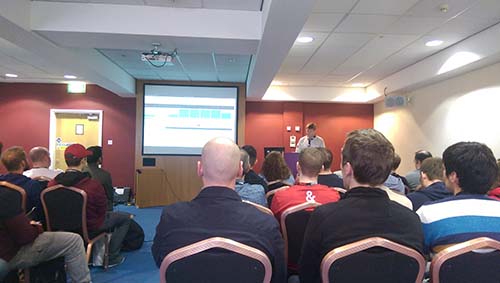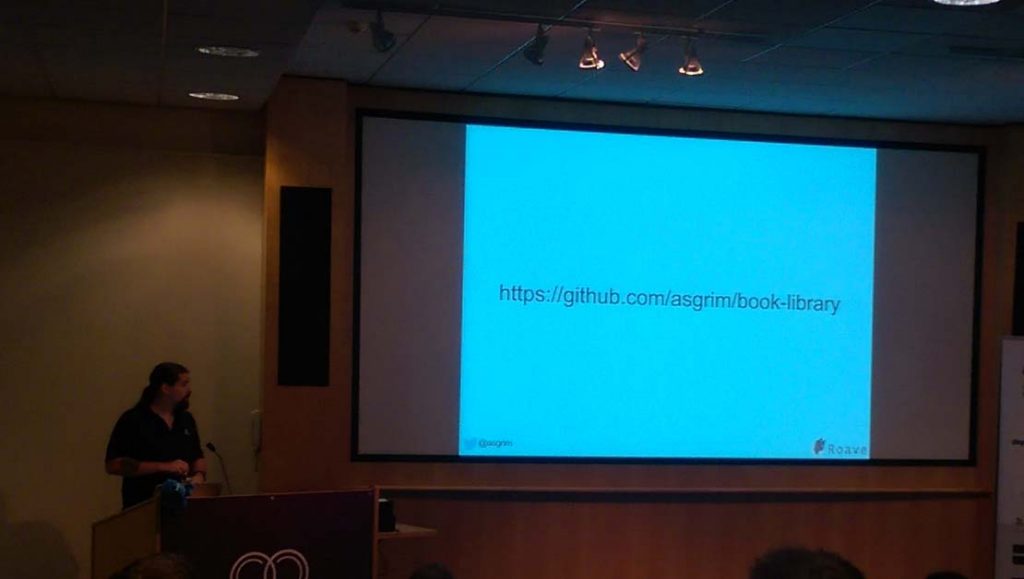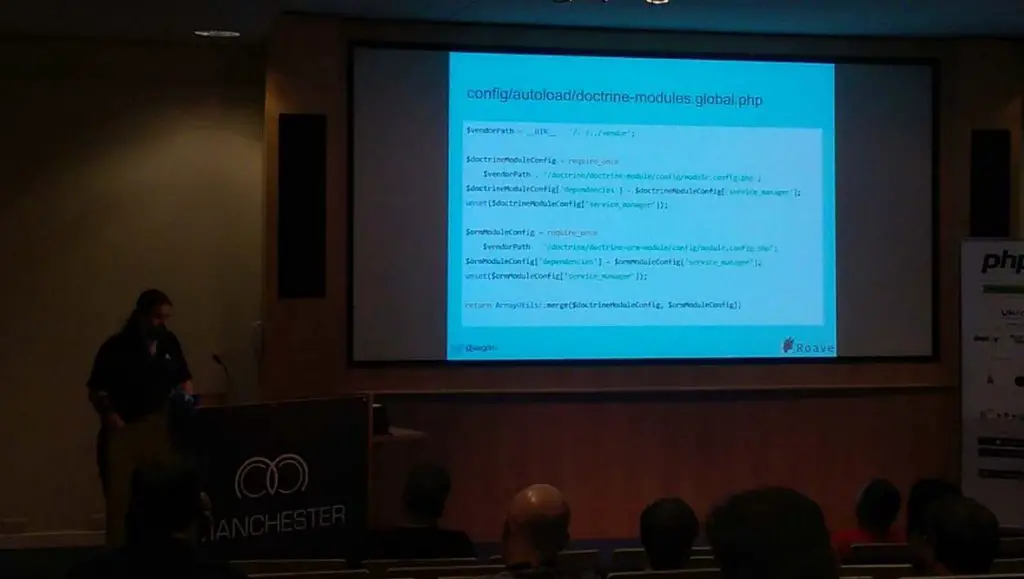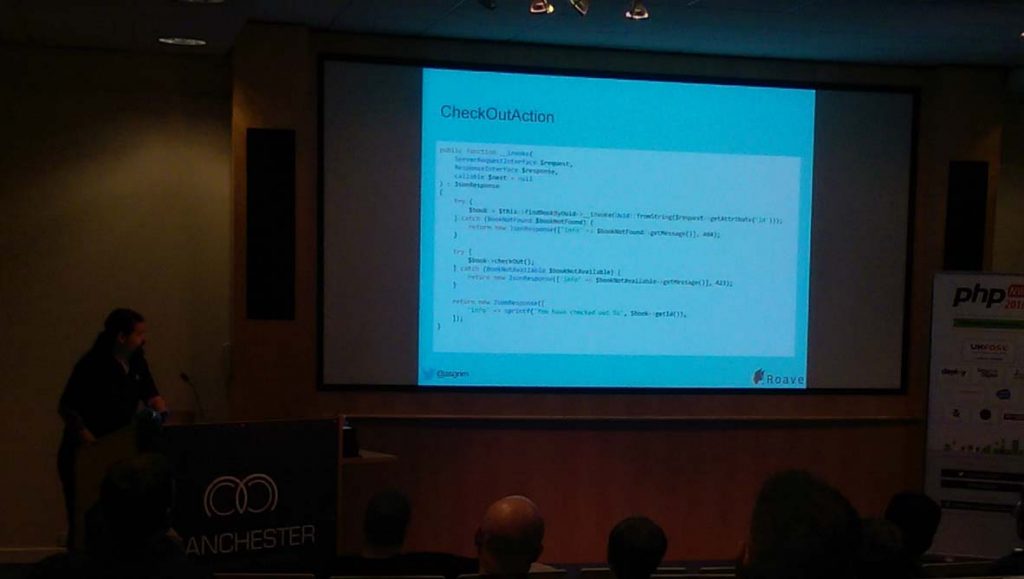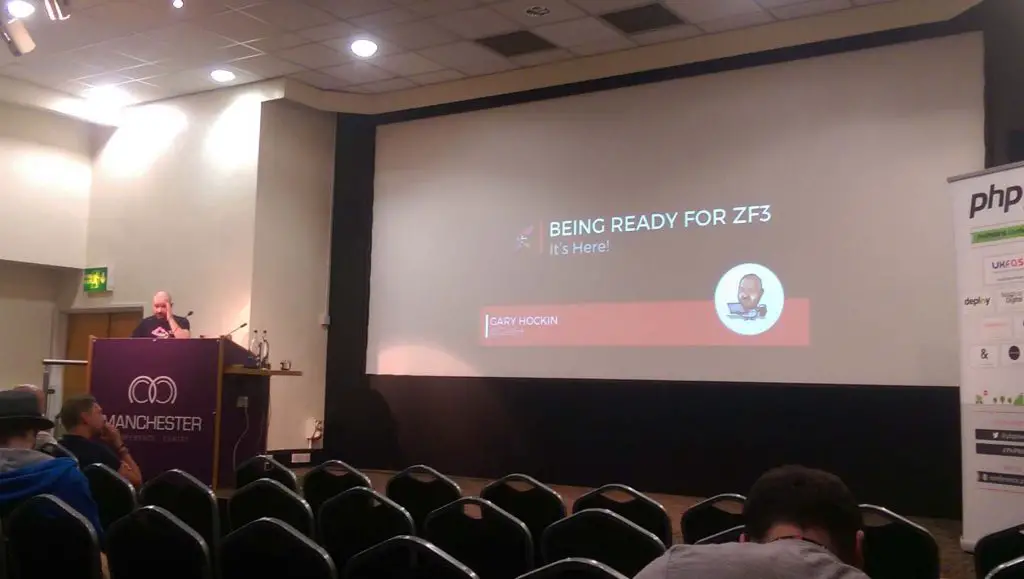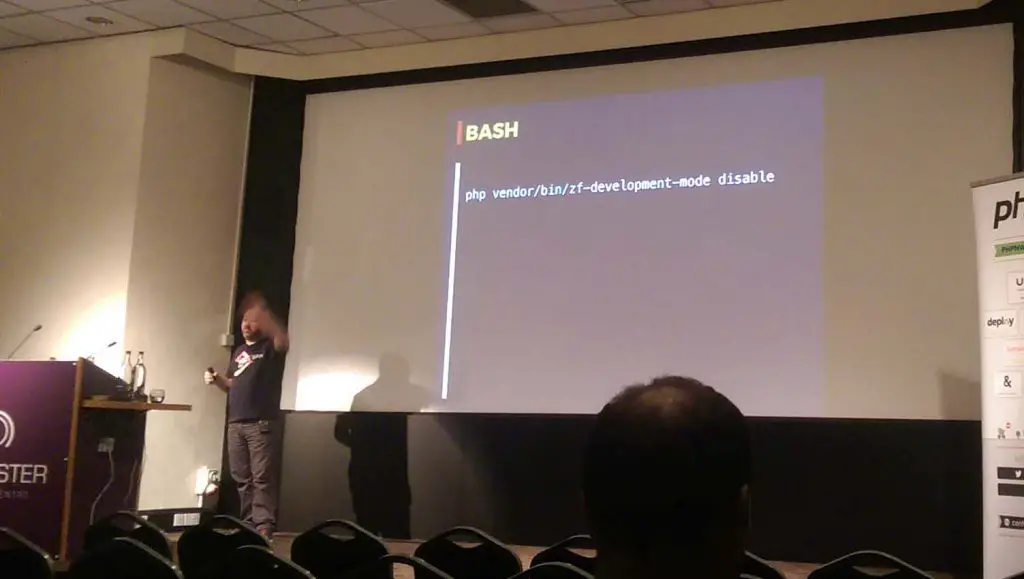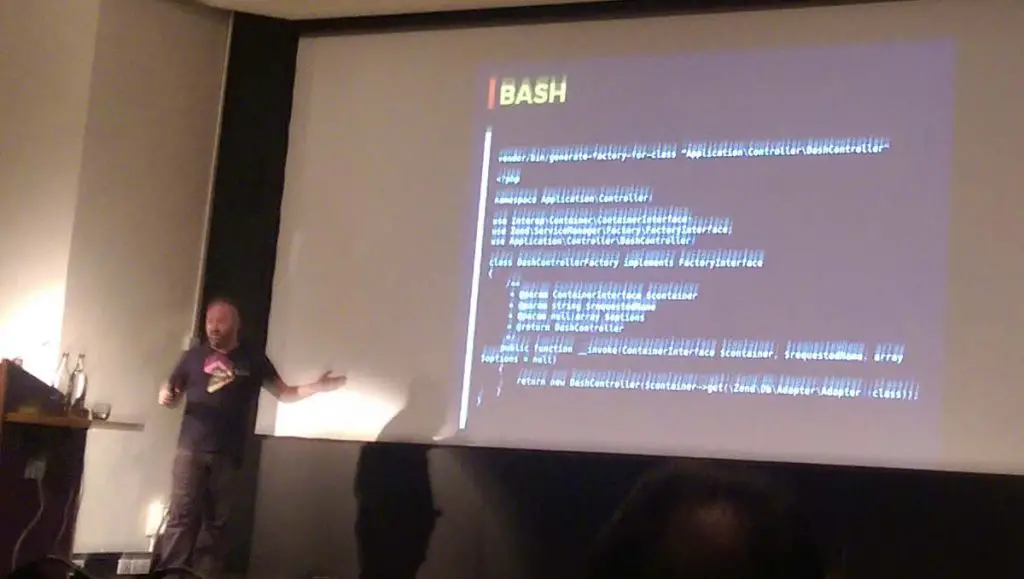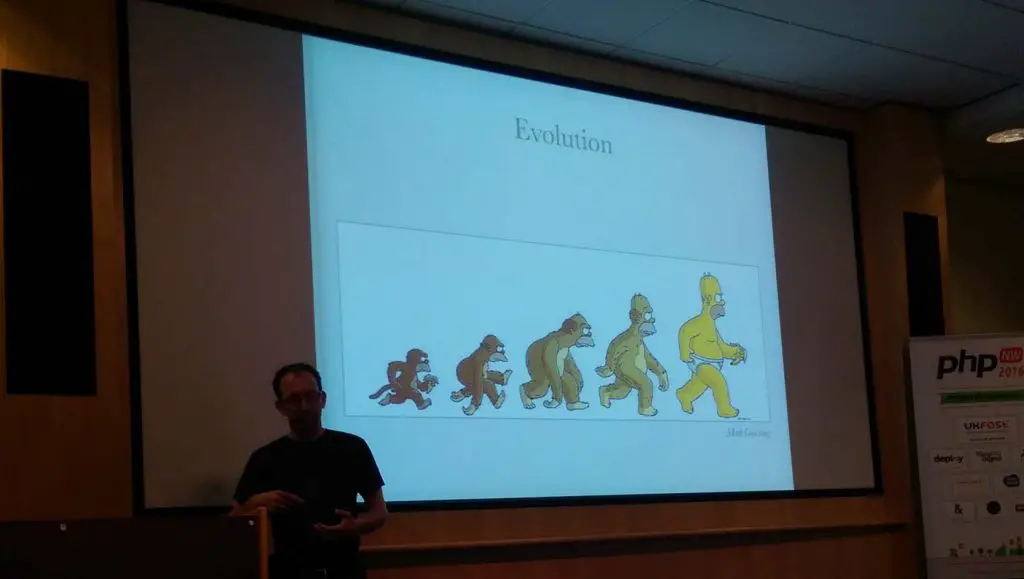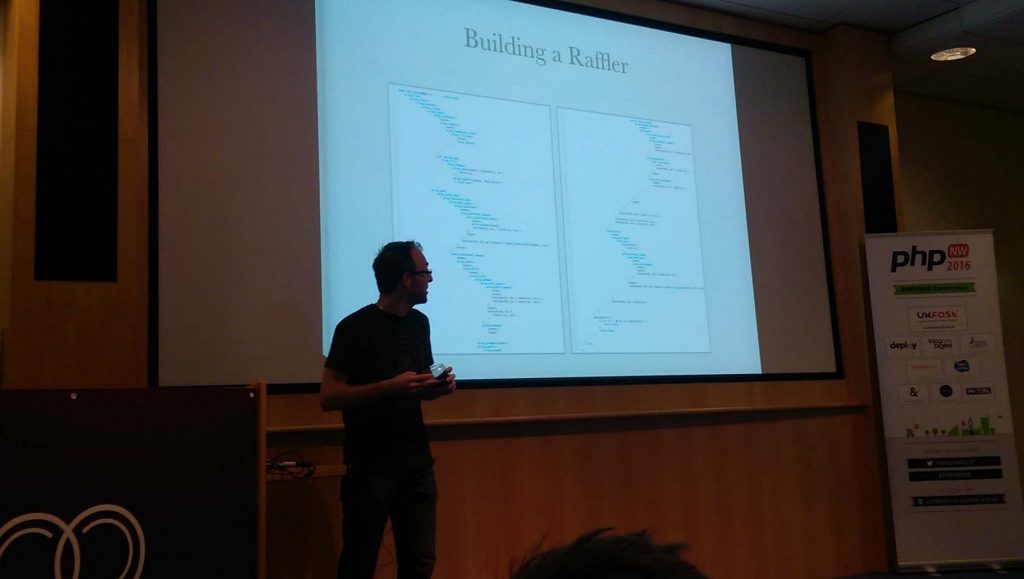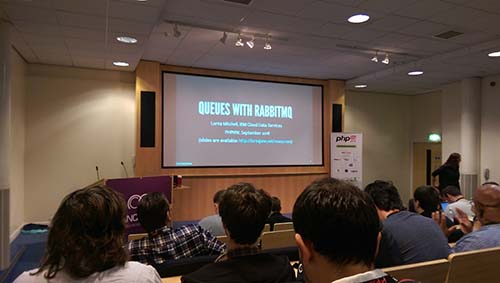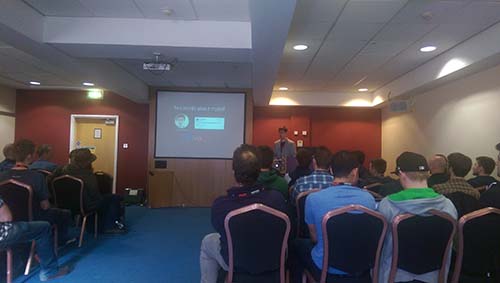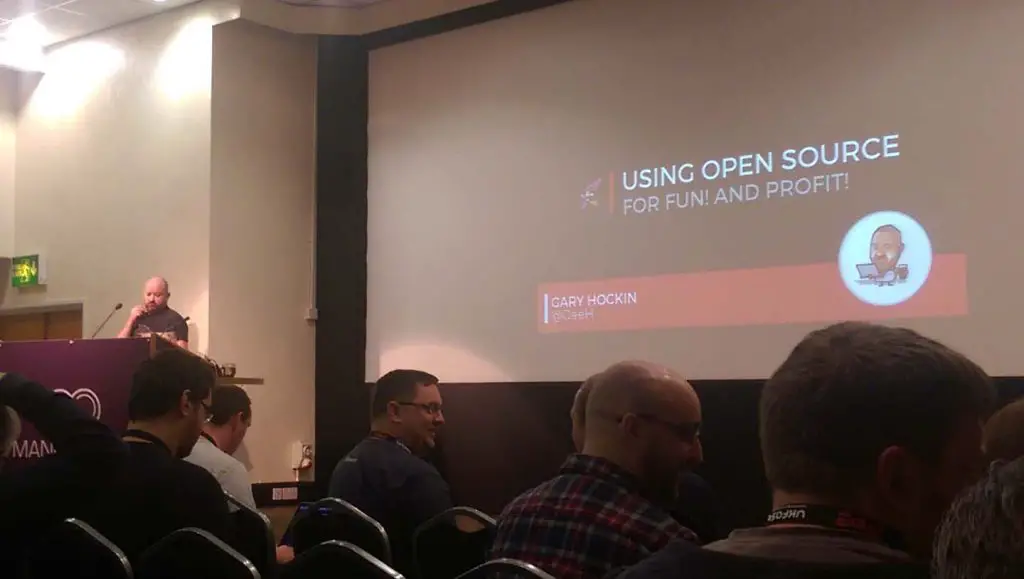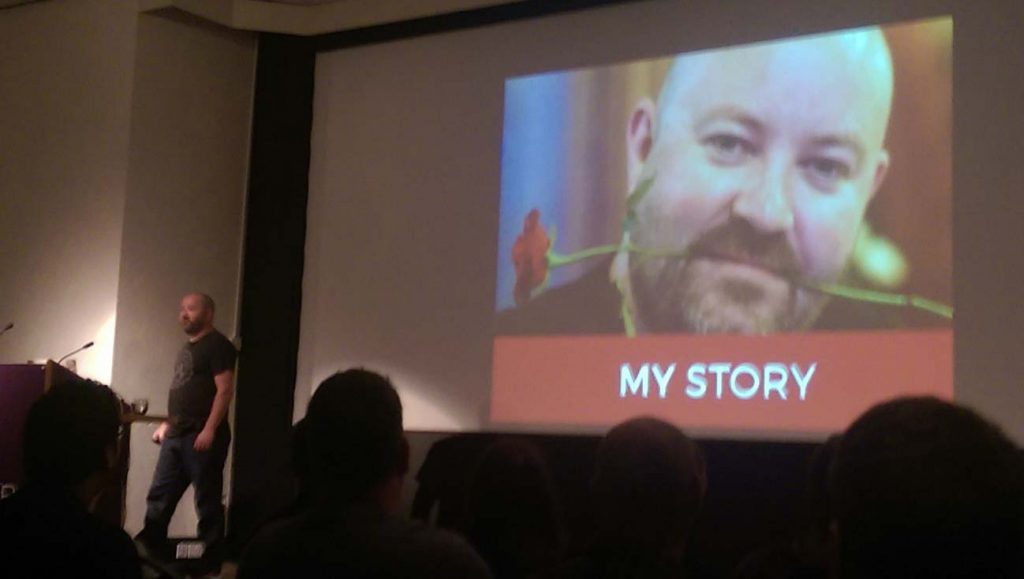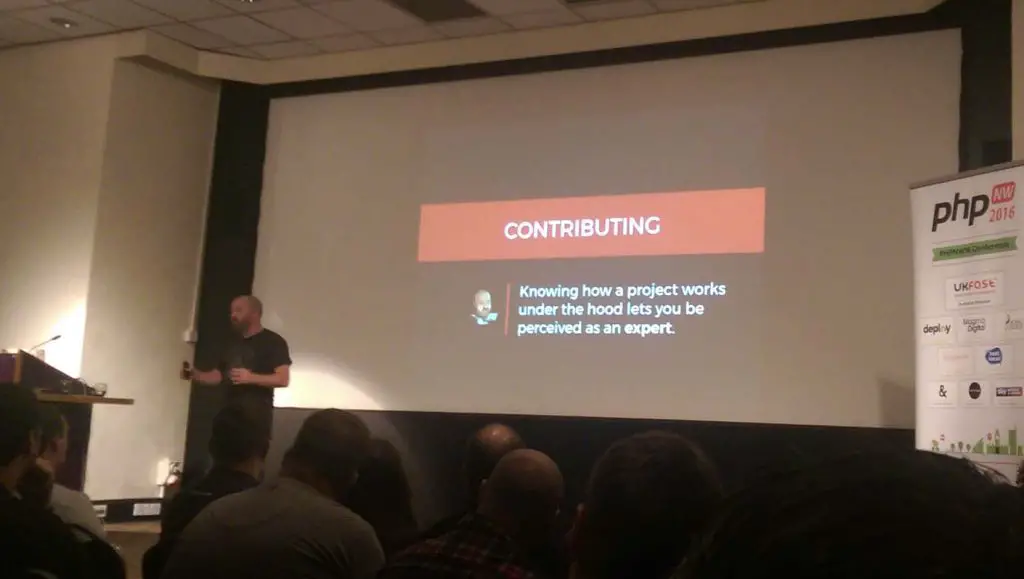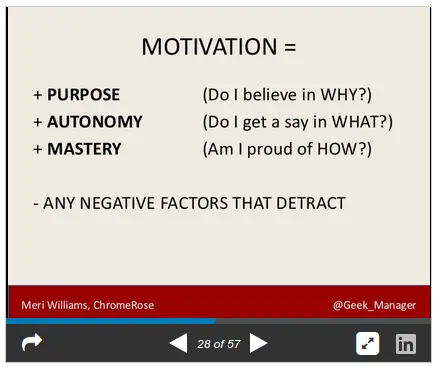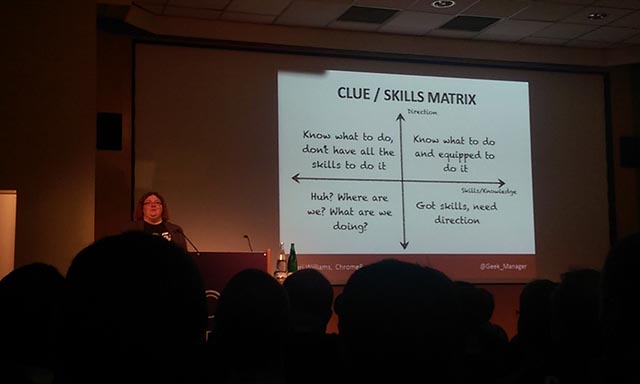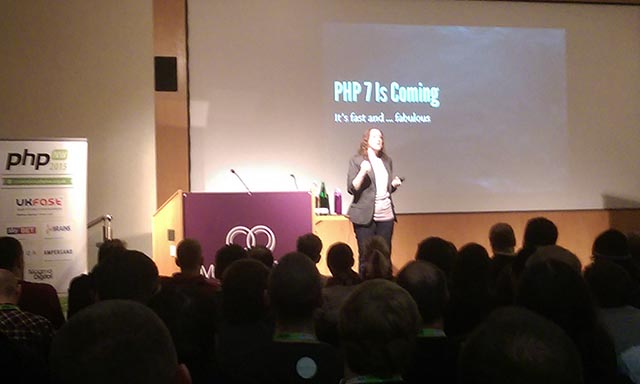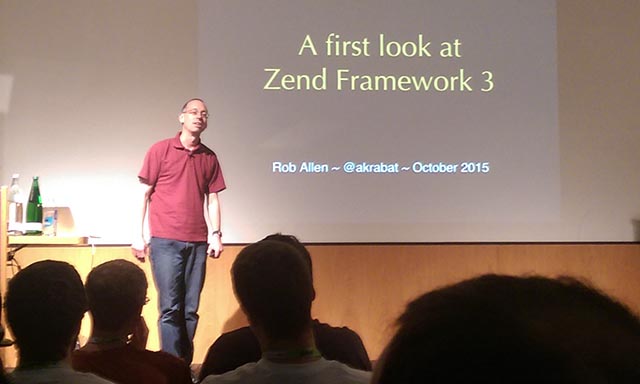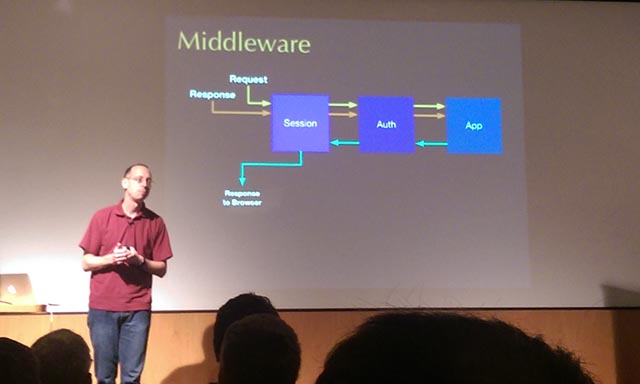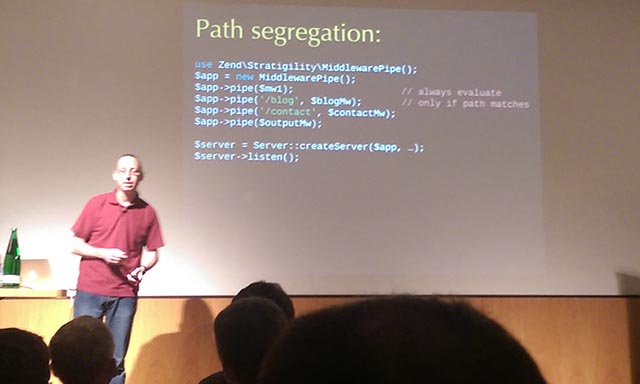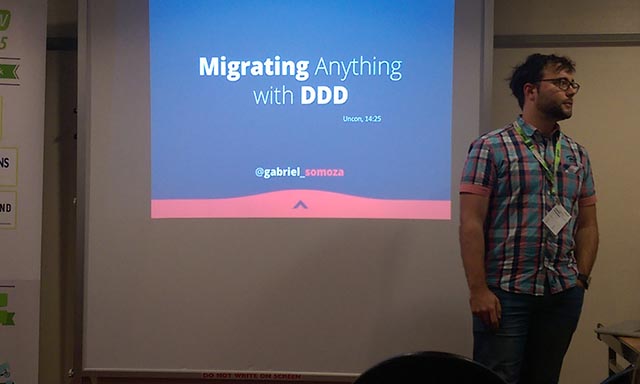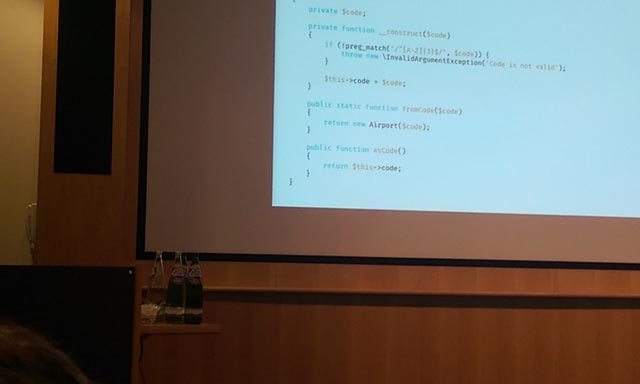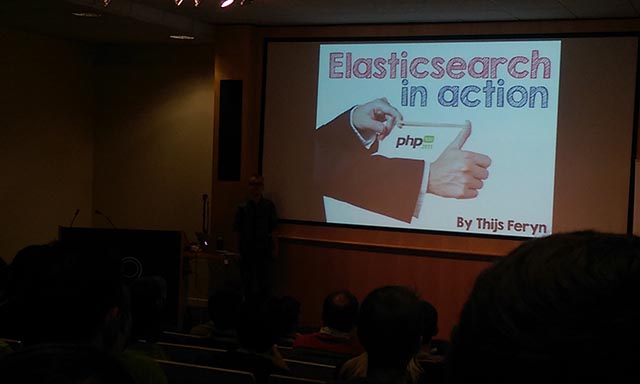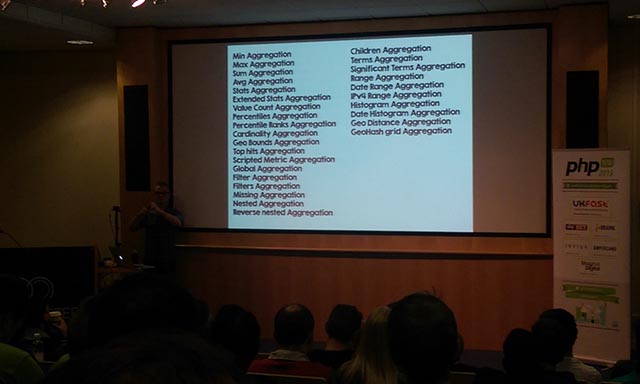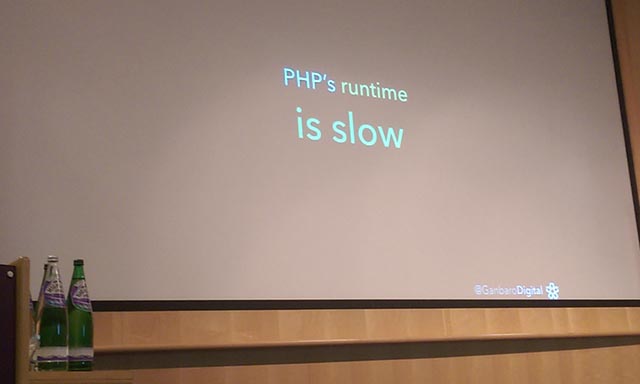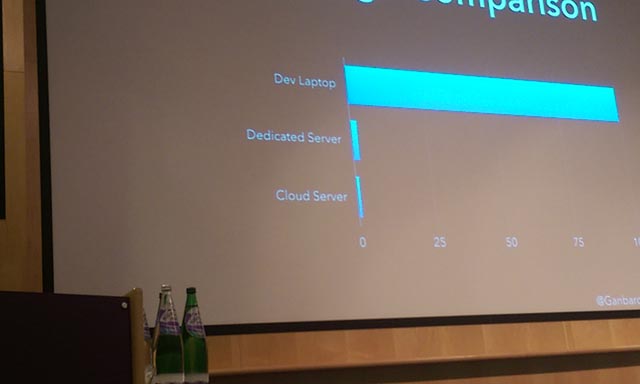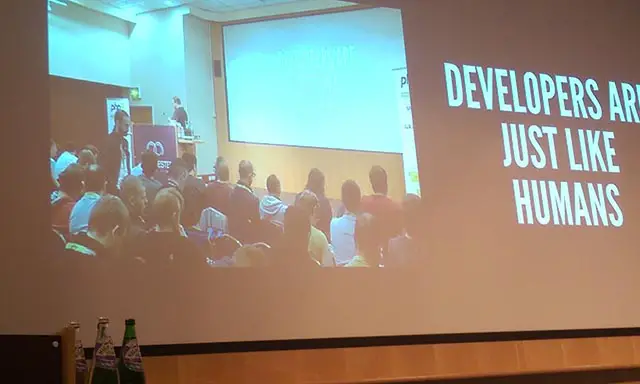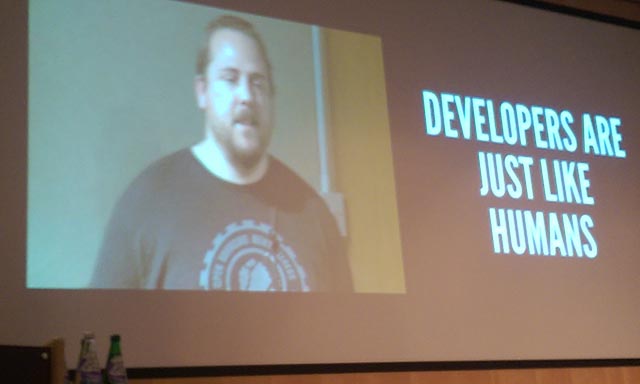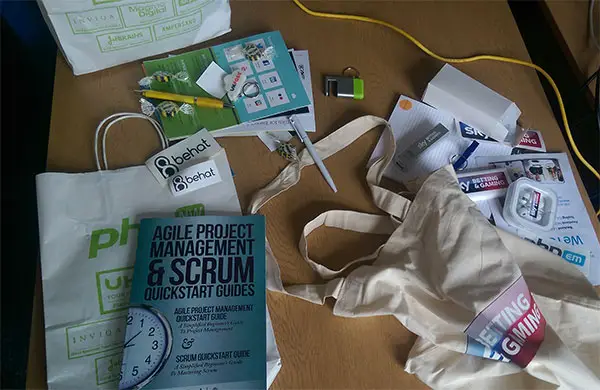This was my fourth consecutive year attending PHPNW, which is now in its 10th year overall.
Why didn’t I attend the first six? I didn’t get involved in the PHP – or indeed any tech – community until then. Probably to my detriment. So, if you’re sat reading this and you’ve never been to a conference then I would urge you to find a local one and head along, even if you go solo (as I always do).
For once I was early, so managed to get a coffee before heading into the keynote.
Keynote – PHP in 2018 – Rasmus Lerdorf
This year the keynote was by creator of PHP, Rasmus Lerdorf.
I thought Rasmus was a myth. Like bitcoin’s Satoshi. #phpnw17
— Code Review (@CodeReviewVids) September 30, 2017
I was very excited when the conference line up was announced and Rasmus was revealed as the keynote. I know, I know, major geekout, but still, this is the person whose hard work has allowed me to do what I do for the past 15 years or more. Without PHP I might still have found my way into software development, but the barrier to entry would have been significantly higher.
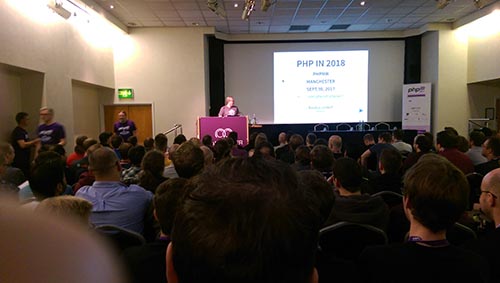
This talk covered a bunch of interesting topics:
Firstly, Rasmus suggested those interested in search technology like Lucene, Elasticsearch and similar should look at Vespa. I saw this on Hackernews the other day but haven’t looked into it as of yet. Rasmus suggested an entire industry might spring up around this, similar to Hadoop.
This slide caught my attention. Although way beyond my personal needs, it’s pretty cool to see that you can create an optimized PHP binary for your specific needs… at least, I think that’s what this is doing.
There were some interesting slides on the financial cost of power savings as a result of using PHP7+. This could be contrasted with Bitcoin:
Running Bitcoin uses a small city’s worth of electricity
I’m not sure of the orders of magnitude, but according to Rasmus’ slides, PHP drives 50% of the web which is ~1 billion websites.
 Currently only ~5% of those are running PHP7.
Currently only ~5% of those are running PHP7.
That 5% equates to ~$200m savings annually. Plus a lot less CO2 in the air.
If PHP7 could reach 100% adoption this could save $4 billion annually, with 7.5 billion kg less CO2.
In other words – switch to PHP7 and save the planet.
Probably the coolest thing coming in PHP 7.2 (in my opinion) is Dead Code Elimination (DCE). What this does, from a very high level, is to analyse your code, and then silently discard any instructions that would have been redundant.
The funny part about this is that the worse your code is, the better your potential savings 🙂 And the joke of it all was that there’s likely a lot of bad code out there in PHP-land (especially if you listen to the haters), so things look rosy 🙂
The slides explain this much better than I could ever hope too, should you wish to understand how. Simply using PHP 7.2 (and especially 7.3+) will give you this benefit for free.
There are a few new features coming in PHP 7.2 that you may find use for. Honestly, there’s nothing here quite as big as those PHP7, nor 7.1.
There is parameter type widening:
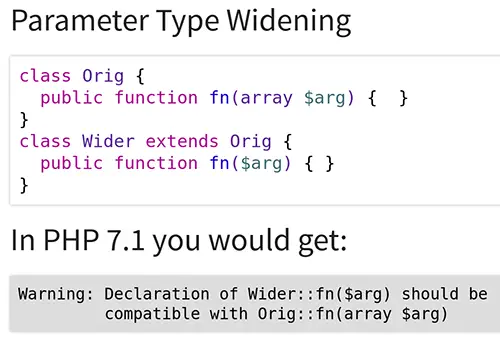
You can use trailing commas everywhere:
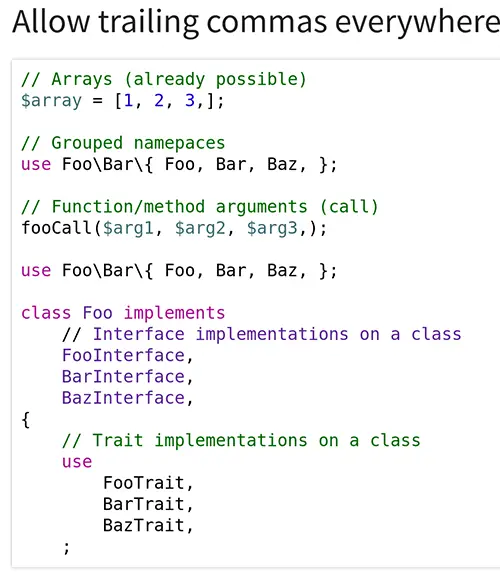
You can now use object as a typehint:
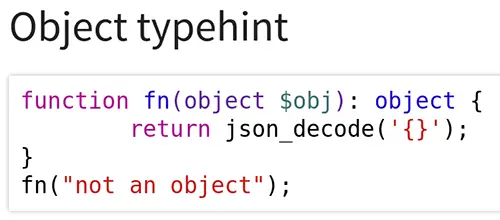
Also Libsodium is now in the PHP Core. Crypto is not my strong point, but my understanding of this is that by having Libsodium as a part of the PHP Core that the resulting code that does need to use encryption, signatures, and password hashing will be more secure by default.
Rasmus gave this link for reference.
Phan was also covered.
Now I recently tried to use Phan against both a Symfony project running on PHP7, and also a legacy app that had a ‘custom’ framework. I struggled with it.
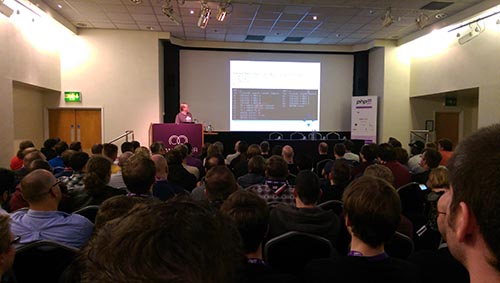
What I’d like to do is put Phan into my GitLab CI pipeline. I haven’t managed this yet as at the time it didn’t work for me ‘out-of-the-box’. I will revisit it though – maybe it would be a good topic for a video 🙂
One thing I did take note of was that Phan works a lot better if you use Docblocks in your code. Yet another reason to document 😀
Overall it was reassuring to see PHP as a language is still being very actively developed, and the future holds a good many treats for us as developers, without us really having to do very much (just upgrade to the latest release).
Meet Terraform – Michael Heap
From the keynote I headed to Michael Heap’s talk on Hashicorp’s Terraform.
Hashicorp make some great tech – Vagrant being the one you’re most likely to have heard of.
 I had heard of Terraform before this talk, but was not too sure how it might fit into my personal dev / ops workflow.
I had heard of Terraform before this talk, but was not too sure how it might fit into my personal dev / ops workflow.
My biggest question before this talk was:
How is Terraform different from Ansible?
Here’s what I concluded:
Terraform allows you to define your server / infrastructure setup as code.
For example, say I wanted three digital ocean droplets of a particular size, in a particular data centre, all named in a particular way.
Terraform makes this easy for me.
I would likely still need Ansible to actually install and configure the software that runs on these machines, however.
After Terraform has created the machines according to my spec, it could invoke my Ansible playbook commands to do this for me.
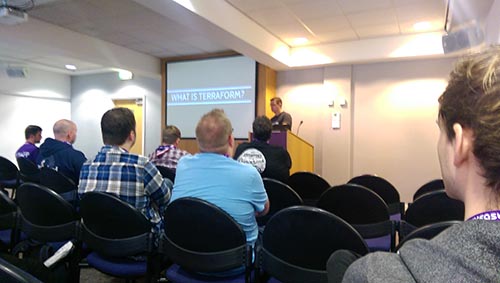
In short, the tools are complimentary, rather than competitive.
Michael shared a bunch of potential gotchas towards the end of this talk. You can find these from slide 87 onwards. I liked this as not only did it demonstrated Michael’s obvious real world experience in using the tool, but also that in reality, once you do start using Ansible, or Terraform, or whatever, they are never quite as simple as you might have been led to believe.
An example of this might be in what happens if you make a mistake. Michael explained that the taint command could be used to mark a box as to be destroyed and re-provisioned. This definitely sounded easier than when things go wrong with Ansible…
Morning Break
During the first break of the day I decided to quickly review the notes I’d taken from the first two morning sessions.
It was at this time I realised my handy note taking app – Gmail – had somehow deleted my draft. Sigh.
Needing a place to sit and hastily re-type my notes, I headed for the ‘Unconf’.
If you aren’t aware, the Unconf is the fourth talk-track. It only announces its speakers on the day, so you won’t find them on the official website. The talks here are shorter – 25 minutes – and often more advanced, or specific in subject.
As soon as I saw a talk about Symfony Flex I decided I would be in there for a while 🙂
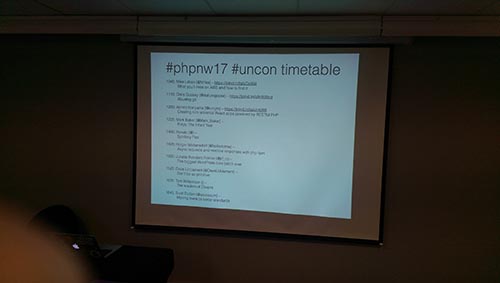
Unconf – Creating Rich Universal React Apps Powered By RESTful PHP – Akihito Koriyama
There was a lot of detail in this talk – more than could be reasonably covered in 25 minutes.
A really useful takeaway for me here was in what the HTTP OPTIONS verb is supposed to be used for. Now, here’s me thinking it’s just the annoying verb that often reports a failure when CORS problems occur 😉
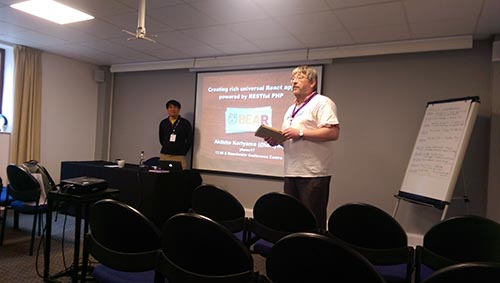
OPTIONS , I learned, are (rather unsurprisingly, given the name) supposed to tell the API consumer exactly what can be done with any given endpoint.
Now this all assumes you are providing a truly RESTful implementation. In most of my projects lately I have instead opted for the simpler approach of providing a JSON API.
There was a lot of emphasis on HAL. All examples were given in the context of Bear.sunday though Akihito did also mention that API Platform offered similar functionality, for the Symfony-inclined.
I really enjoyed this talk. I wish I had taken further notes around Akihito’s implementation of Server Side Rendering, which has become a problem for me in the time since attending PHPNW17.
Unconf – Enfys: The Infant Year – Mark Baker
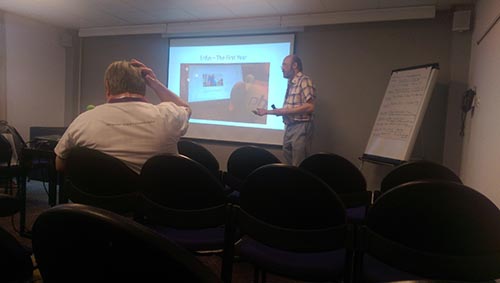
I had absolutely no idea what Enfys was before this talk.
You may not either, so allow me to enlighten you:
Enfys is the Elephant plushy representing diversity in the PHP Community.
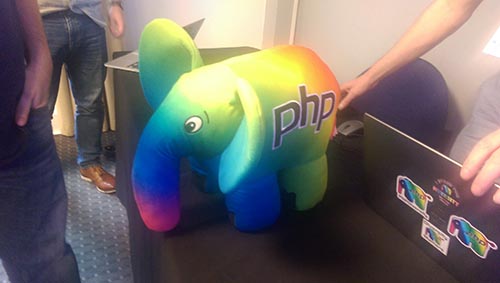
This talk was all about the journey from idea to successful kick-starter.
This was an absolutely fantastic talk, well delivered and full of warm feels 🙂 It is obvious that Mark cares passionately about his project, and its wider implications.
I would strongly recommend reading the kickstarter page as it contains a great description of what this project is about, and why it’s needed. I confess my ignorance to issues like this well in advance. Being that I work almost entirely remotely, I have never experienced any of the problems that this project aims to address. Without attending PHPNW17 I likely would never have come to hear about this project.
I had to ask – what does Enfys mean? Mark told a wonderful story of how he came across the name. Again from the kickstarter page:
“Enfys” is a Welsh name meaning “Rainbow”, and is gender neutral (it can be used for both boys and girls), so it seemed an ideal name for a new Rainbow Elephpant, to promote Diversity within the PHP Community.
Brilliant.
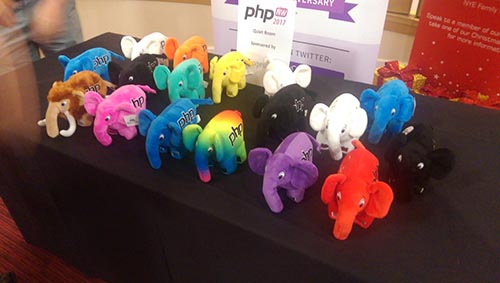
Dinner Time
 I wouldn’t normally spend too long on the dinner time round up, but at PHPNW17 I got lucky.
I wouldn’t normally spend too long on the dinner time round up, but at PHPNW17 I got lucky.
Rasmus, less so.
One of the strange parts about the PHP North West conference is that at dinner time the food is served in the main exhibition hall area, but you can eat in the unadvertised dining area.
Fortunately having been a few times now, I knew about the dining area, as eating a chicken steak stood up is not easy to do.
Anyway, in I went and being a loner, it’s usually fairly easy to find a seat.
I spied 3 empty chairs towards the back of the room, and plonked myself down.
Shortly after, Rasmus arrived back to his chair – the very next chair – and took his seat. Oops, had I stolen Rasmus’ seat? Alas no. Thankfully.
Anyway, not wanting to miss my opportunity, I asked if he’d mind my interruption for a question. He obliged.
After thanking him for giving me the opportunity to do what I do (in a roundabout way), I asked him: why Etsy?
Here is a person who can very likely walk into literally any tech job in the world – so I was entirely curious as to why he would take that job.
Rasmus explained how Etsy is a great choice if you want to make a real difference to the lives of artists.
There’s a ton of opportunities about (particularly in Silicon Valley) that are simply about making money for the various mega-corps, but Etsy enables real people to make a living from their art work.
I can identify with this not just because my wife is an artist, but because as coders a lot of what we do is more art than science. Well, at least that’s my interpretation of it. I can totally understand why Rasmus would take such a role.
Symfony Flex 101 – Renato Mendes Figueiredo
 Symfony Flex is just around the corner. If you haven’t heard of Symfony Flex yet (come out from under that rock!) then you will do as of November 2017, when Symfony 4.0 becomes the new stable release.
Symfony Flex is just around the corner. If you haven’t heard of Symfony Flex yet (come out from under that rock!) then you will do as of November 2017, when Symfony 4.0 becomes the new stable release.
My understanding of it is that Symfony Flex replaces the Symfony Installer. Symfony Flex aims to reduce / remove the boilerplate config needed to get most any Symfony bundle up and running.
The main point of concern I have currently is that this will possibly make it harder, not easier for those new to Symfony to get started. My own observations are that Symfony has lost a sizable chunk of new project market share over 2017 because of how difficult, by comparison, it is to get started with Symfony compared to e.g. Laravel.
Anyway, Renato’s talk was thankfully not about such things.
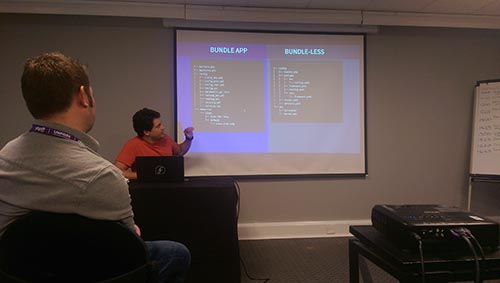
Instead it focused on how to use Symfony Flex to get a new project up and running. A live demo, over a potentially sketchy wifi connection is always fun, but Renato pulled it off.
Renato covered how to use some of the official recipes – for example to get the Web Debug Toolbar, and Web Server pulled into the project, and up and running without any configuration required.
Renato then covered pulling in, and starting a GraphQL server. All rather fantastic.
I thoroughly enjoyed this talk. I thought it was well presented, and the content was easy enough to digest in the allotted time. I found the demos interested, and the presentation style both relaxed and informative.
Great stuff.
Async requests and reactive responses with php-fpm – Holger Woltensdorf
This talk covered a problem that so many non-trivial PHP applications face:
How to do work in the background without it becoming a nightmare?
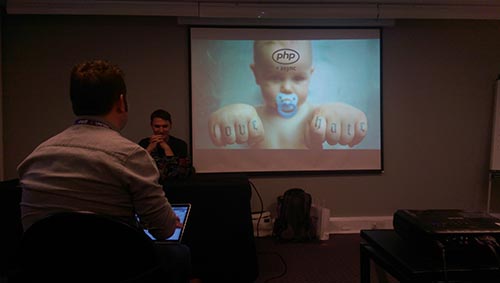
Typically when faced with background jobs I would reach for RabbitMQ. Holger showed that perhaps we could use PHP-FPM for the job, instead.
This is a really interesting project which I would advise you check out on GitHub.
The problem defined here has been puzzling me for a while. My personal experiences with RabbitMQ have been largely enjoyable in development, and largely horrible in production.
My own experiences tell me this is a really tricky and complex problem. The solutions to which are exactly the kind of black-box code that cause head-scratching and hair loss when they go wrong. If you have such a problem, potentially Holger’s library may offer you a solution.
As a side note I’ve lately been looking into the Elixir language as a potential alternative in this problem space. Some of the built-in features offer a potentially ‘simpler’ (or at least, less black-box-y) alternative. Time will tell.
Baking security into your workflow – Tim Nash
I have to admit by this point I was flagging. My brain was filled with good, useful stuff. What better then than a security talk!?
Fortunately Tim was full of enthusiasm and joviality, and was clearly enjoying presenting.
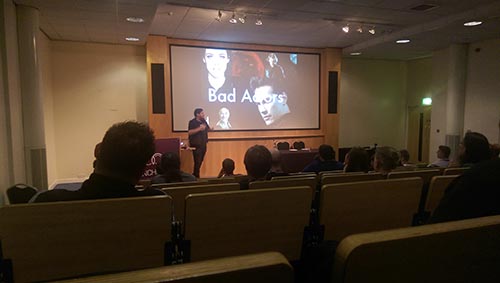
Tim drilled in the oft-repeated maxim of never trusting user data. Ever.
If you receive data from end-users then it must be validated. Good solid advice.
It made me think of how sometimes this kind of advice is really hard to bake into a real workflow, however.
For example, when working with Stripe and their Webhooks, one of their recommended practices is to verify the data signature. This is good advice, of course, but with some of Stripe’s Webhook data, it is impossible (to the best of my knowledge) to test – because the signatures don’t work in their faked / test responses. At least, that was my experience.
Of course this isn’t a slight on Tim’s talk in any way. It is simply that even with the best of intentions, security is flippin’ hard.
Tim shared a bevvy of useful tools, so here goes:
- Kali Linux – full of hacker tools which you can pen-test your network / website(s) with.
- Metasploit – I *think* this was the one Tim said was most Scriptkiddy-ish.
- OWASP Zap – good, but possibly going to give false positives / noise
- Vesuppi Garcon – detect a bunch of bad stuff via static analysis. Maybe useful in your CI pipeline?
A couple of other points made where:
- Disable registration on your WordPress blogs, if at all possible. And certainly don’t make the default user role to be Administrator. Lel.
- Watch your mail queue – often spikes are a great indicator of hacks.
The GDPR is coming, are you ready? – Michelangelo van Dam
The short answer: probably not.
The General Data Protection Regulation (GDPR) is a law that’s going to affect most everyone, as best I understand it. Essentially if you collect and process privacy related of EU subjects, you need to be paying attention.
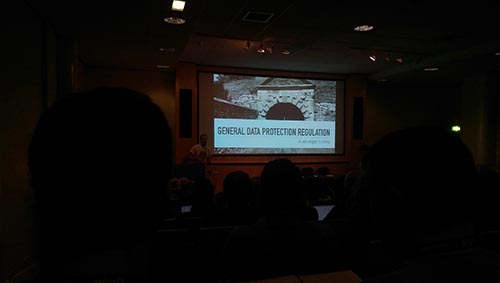
(sorry that’s a terrible photo, and that’s saying something as typically my photos are terrible to begin with :))
Most big businesses have not got their acts together regarding GDPR as of yet.
You kinda ought to take this seriously, as if you suffer a data breach and are subsequently found responsible,and fined, you may very well be put out of business as the fines are incredibly steep.
One key takeaway from this talk is that you cannot be compliant with GDPR – you can only be ‘ready’. And defining ‘ready’ appears to be the biggest grey area of all.
It’s highly contentious, as was demonstrated during the QA section of this talk.
Hallway Track
For the first time ever at a conference I skipped a session (the closing session) to chat with a fellow dev.
I had a great chat with Rick West, who I encourage you to follow on Twitter.
Thanks Rick 🙂
After this it was back down the M61 for me, home in time for tea and medals.
Day 2
Yes, PHP North West is a two day conference over both a Saturday (all day), and a Sunday (till 13:00).
I missed the opening address – in fact, I didn’t even know there was an opening address on day 2 until reviewing the schedule for this blog post. Whoopsie daisy.
Chatbots and PHP – Katy Ereira
This was my favourite talk of the entire conference.
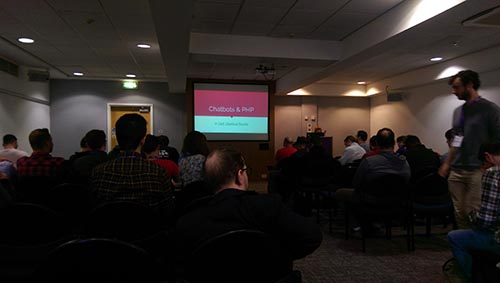
I remember relatively recently having a discussion with my wife about how, when I used to go to a bunch of business networking events, I was always getting asked “do you make apps?”, and “how much for an app?” etc. So many variants. So many people wanting the next Facebook for £1000.
Anyway, I don’t go to any of those business networking events anymore. Success.
But after hearing Katy mention how Bots are the new Apps, I do wonder now if the questions have changed to “how much for a bot?”. Thankfully, I’m happy to wonder.
I really enjoyed this talk because of how wonderfully practical and inspiring I found the content.
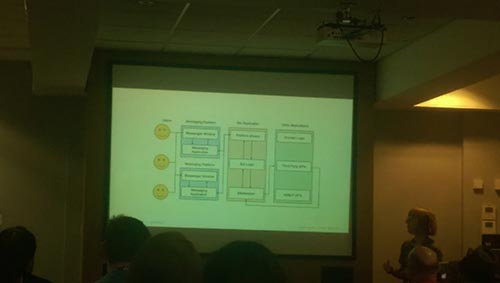
The examples were clear, and I could envisage real world use cases immediately.
The concept for the bot used in the talk was to accept restuarant reservations. To begin with this began as a command line app, but Katy explained how this could be turned into a Facebook or Slack bot without a huge amount of effort.
Times have moved on since I last looked into some of the concepts behind how these bots work. I remember working with spammy article spinners that would convert / spin articles using { he | him | man | person } sorts of thing, and the resulting articles came out at about the same quality as paying $5 for 10,000 words on odesk (ahem, upwork :/).
Nowadays, however, we don’t need to concern ourselves with such matters. Instead, Katy explained how we can simply hook into Google or Facebook’s AI, and get them to figure out what the user is talking about. Very fascinating, though I’m somewhat dubious about Google / Facebook’s longer terms plans from all this data collection.
Skynet was mentioned 🙂
Some interesting links:
Beep boop.
Teaching the next generation – Michael Woodward
I attended this talk as it seemed to be inline with what I’m trying to do.
Michael introduced us to his project – PHP School, which if you have ever used Node School should feel instantly familiar.
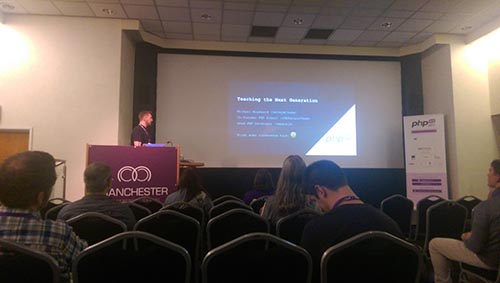
Taking ownership of your learning is a concept I feel more developers should pay attention too.
I strongly believe that being a software developer – if you enjoy writing software – is the best job in the world.
MySQL Worst Practises: Bring your system to its knees – Andrew Moore
After a somewhat unusual start, this talk was amongst my favourites of the conference. Fortunately I don’t do a huge amount with vast volumes of data in databases as of late, and haven’t had to do ops tasks on such complex setups as described for a good long while.
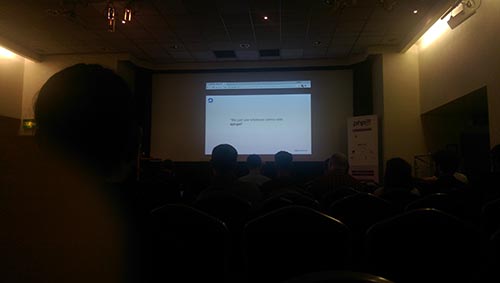
This talk, as the name suggests, focused on stuff that you ideally should not do if you want to get your 8 hours of sleep per night.
These included:
- Don’t use NFS
Putting your database on disk accessible via the network introduces latency, which makes people sad.
- SAN / NAS also not good because of the latency, and are effectively an expensive single point of failure.
NetApp were mentioned. Ho ho.
- RAID 10 is preferable for your DB disk
- Don’t put your temp dir on same disk as the data dir
Say no more.
- Don’t use Windows as server
I wasn’t going to write anything further here, but Andrew did expand on that this is because lack of access to good MySQL tooling.
- Don’t use MyISAM
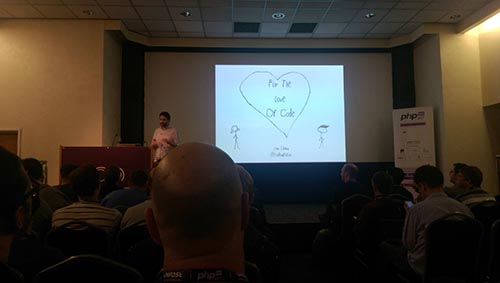
Closing Keynote: For The Love Of Code – John Cleary
This talk had a couple of important points that left a lasting impression on me:
- If you want to do the Keynote, then you should ASK.
I don’t want to do a keynote. As a matter of fact, conference speaking in general holds very little appeal to me.
But asking is so, so important.
One of the hardest things do as a developer can be to ask for help. It feels like defeat.
However, often those around you would much rather you simply ask early, rather than spending hours / days / weeks going down rabbit holes or feeling lost / confused / distressed.
What’s the worst that can happen if you ask? You get rejected. Rejection sucks, but at least you asked. Now go ask someone else 😀
2. Test Your Core Values
In order to test your core values, you need to know what your core values are.
Now this exercise is beyond the scope of this blog post, but it’s well worth taking the time to do this, even if it feels like bull hockey.
The content of this talk is based on the book The 7 Habits of Highly Effective People by Stephen R. Covey. Also his website is built with PHP, so no excuses.
My only criticism of this talk was that it was too short. I’m not even sure why it was so short, perhaps it was explained but I missed it.
And On That Bombshell
All that remained was for the conference to be closed for another year.
At this point Jeremy dropped the bombshell that this was to be the last PHP North West conference for the foreseeable future.
I can understand this: plenty of conferences organisers have stated just how physically and emotionally taxing it is to run a conference, and after 10 consecutive years the entire crew of PHPNW are only to be applauded.
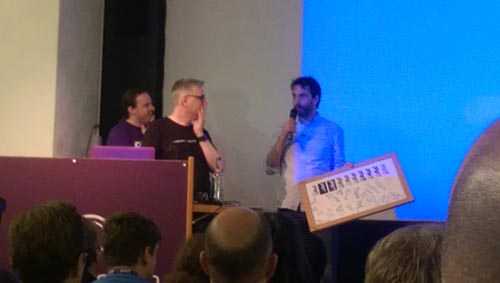
And indeed they were, with a standing ovation.
I’m not sure how to take the news that PHPNW18 won’t be a thing. I’m not sure what it says about PHP. This was the (possibly unanticipated) message that I pondered on my journey home.
The truth is PHP is not a sexy language right now. It hasn’t been for a good long while, and possibly never will be again. Depending on where you are in the world right now, there may be a language that is dominant in your location.
Typically that language is JavaScript.
I don’t see any immediate issue for PHP. For the next decade or so everything should be business as usual.
But as we approach 2030, will PHP still be relevant? It’s hard to say. And it ties in with the decline in new developers taking an interest in the language.
Anyway, rather than end of such a downbeat note:
I have thoroughly enjoyed my previous four years at PHP North West, and want to say a huge thank you to everyone involved in making it happen. I hope to see you all again in the future 🙂

